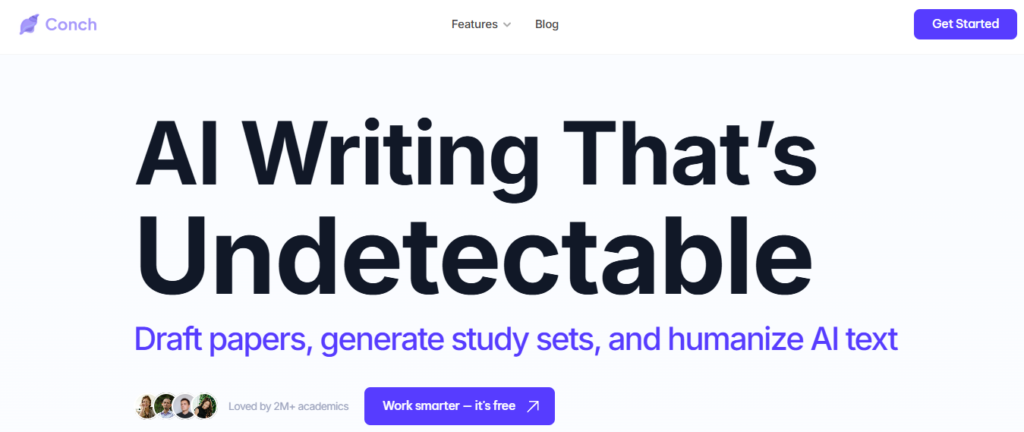When it comes to writing a well-structured essay, understanding how to use AI to write a paper can seem overwhelming. Using an AI tool to help you write takes all the creativity out of writing. But that’s not true! While AI can help you generate new ideas and write better drafts, you still need to understand the basics of essay writing before you turn to artificial intelligence for assistance.
For example, do you know the difference between a topic sentence and a thesis statement? If not, you’re not alone. Many students don’t realize that a thesis statement differs from a topic sentence, despite both elements dealing with the main idea of an essay and helping to structure writing.
This guide will help you understand the differences between topic sentences and thesis statements, enabling you to write clear and focused essays. You’ll even learn how to use Conch AI’s AI writing tool to help you master both elements.
What Is a Topic Sentence?

A topic sentence is a sentence that expresses the central idea of a paragraph or section in a piece of writing. It serves as a guide, informing readers about the topic the paragraph will cover. It serves as a summary or a mini-thesis statement for that specific paragraph, helping readers anticipate the content and flow of the supporting details that follow.
By presenting a clear and focused idea, a topic sentence helps organize writing logically and improves readability. It ensures that each paragraph maintains a distinct purpose and contributes meaningfully to the overall argument or narrative.
Examples of Topic Sentences
Here are five examples of effective topic sentences, each introducing a clear central idea for a paragraph:
- “Adopting renewable energy sources is essential for reducing global carbon emissions and combating climate change.”
- “The rise of social media platforms has transformed how people communicate and share information worldwide.”
- “Learning a second language enhances cognitive abilities and opens up new cultural experiences.”
- “Urban green spaces play a crucial role in improving air quality and providing recreational areas for city residents.”
- “Technological advancements in healthcare have significantly increased patient survival rates and improved treatment options.”
Each of these sentences sets a clear direction for the paragraph, preparing readers for the detailed explanations or evidence that will support the main idea.
Features of a Good Topic Sentence
A strong topic sentence typically exhibits the following features:
Clarity and Simplicity
It uses straightforward language that is easy to understand, avoiding unnecessary jargon or complicated terms.
Specificity
It precisely states the main idea without being too broad or ambiguous, so readers know exactly what to expect.
Focus
It centers on a single central point, steering clear of multiple ideas or distractions that could confuse the reader.
Relevance
It directly relates to the paragraph’s content, ensuring that the supporting details align with the topic sentence.
Engagement
It captures the reader’s interest by being thought-provoking or compelling, encouraging them to continue reading.
Conciseness:
It is concise yet informative, conveying the main idea efficiently without unnecessary verbiage.
Positioning
Typically, it appears at the beginning of the paragraph to provide immediate context, though it can sometimes be placed elsewhere for stylistic reasons.
Related Reading
- How to Calculate H Index
- How to Write an Informative Essay
- Technology Essay
- How to Write a Header for an Essay
- How to Write a Biography Essay
- How to Write a Reflection Paper
- How to Write an Encyclopedia Entry
- Speech Analysis Example
- What is a Good H Index
What is a Thesis Statement?

A thesis statement is a single sentence that encapsulates the central argument or main point of an essay or research paper. It serves as a concise summary of your primary claim and establishes the tone and direction for the entire piece of writing. It acts as a guiding beacon for readers, helping them grasp the purpose and trajectory of your work from the outset.
A well-crafted thesis statement is specific, debatable, and directly related to the topic at hand. It provides a clear roadmap for the essay, outlining what readers can expect in terms of arguments and evidence.
Examples of Thesis Statements
Here are five examples of effective thesis statements, each presenting a clear position on a topic and setting the stage for further discussion:
- “Although renewable energy sources require significant initial investment, they offer long-term economic and environmental benefits that outweigh traditional fossil fuels.”
- “The increasing use of artificial intelligence in healthcare improves diagnostic accuracy but raises ethical concerns regarding patient privacy and data security.”
- “While online education provides greater accessibility, it cannot fully replace the social interaction and hands-on experiences offered by traditional classroom settings.”
- “Government policies aimed at reducing plastic waste are essential, but consumer behavior change is equally critical to achieving sustainable environmental outcomes.”
- “Despite the popularity of fast fashion, supporting local and sustainable clothing brands promotes ethical labor practices and reduces environmental harm.”
Each of these statements expresses a clear viewpoint, inviting readers to explore the supporting arguments and evidence presented in the essay.
Features of a Good Thesis Statement
A strong thesis statement typically exhibits the following seven characteristics:
Specificity
It clearly defines the main argument without being too broad or vague, allowing readers to understand precisely what the essay will address.
Arguability
The thesis must present a claim that can be debated or challenged, encouraging discussion rather than stating an indisputable fact.
Relevance
It should directly relate to the essay’s topic and align with the supporting points and evidence that follow.
Originality
A compelling thesis offers a fresh perspective or insight, avoiding clichés or overly general statements.
Clarity
The statement should be expressed in straightforward, concise language, free from jargon or complicated terms that confuse readers.
Focus
It maintains concentration on a single main idea, steering clear of unrelated topics or multiple conflicting claims.
Conciseness
A good thesis is concise yet comprehensive, conveying the core argument clearly and concisely without unnecessary words.
Topic Statement vs. Thesis Statement

In writing, both topic statements and thesis statements play crucial roles, yet they serve different functions and possess distinct characteristics. Grasping the difference between these two can significantly enhance your ability to communicate ideas clearly and persuasively, ensuring your writing is well-organized and compelling.
The Main Difference
The primary distinction between a topic statement and a thesis statement lies in their scope and purpose. A topic statement expresses the main idea of a single paragraph or section, acting as a guidepost for that specific part of the text. In contrast, a thesis statement encapsulates the central argument or claim of the entire essay or research paper, setting the direction for the whole piece.
Topic Statements vs Thesis Statements
1. Scope
- Topic Statement: Focuses narrowly on one paragraph or section, outlining the main idea to be discussed there.
- Thesis Statement: Has a broad scope, covering the entire essay or research paper’s central argument.
2. Purpose
- Topic Statement: Introduces the main idea of a paragraph or section, helping readers understand what that part will discuss.
- Thesis Statement: Presents the overall argument or claim, guiding the reader through the writer’s position on the topic.
3. Tone
- Topic Statement: Generally neutral and straightforward, simply stating the idea without persuasion.
- Thesis Statement: Often persuasive, taking a definitive stance and inviting readers to consider or debate the argument.
4. Length
- Topic Statement: Usually concise and brief, often just one sentence.
- Thesis Statement: Can be longer and more detailed, especially when the argument is complex and requires explanation.
5. Placement in Text
- Topic Statement: Usually appears at the beginning of a paragraph to set the stage for what follows.
- Thesis Statement: Typically found at the end of the introduction, it summarizes the main point that the essay will prove or discuss.
6. Function in Structure
- Topic Statement: Helps organize the paragraph’s content and maintain focus on a single idea.
- Thesis Statement: Provides a roadmap for the entire essay, indicating what arguments or points will be made.
7. Flexibility
- Topic Statement: Can change from paragraph to paragraph to reflect different ideas within the essay.
- Thesis Statement: Remains consistent throughout the essay, serving as the foundation for all supporting points.
Related Reading
- Essay on Respect
- Essay About Bullying
- Why I Deserve This Scholarship Essay
- Is Census Data Primary or Secondary
- Is a Documentary a Primary Source
- Are Textbooks Primary Sources
- Essay About Death
- How to Write a 4 Paragraph Essay
- Finance Research Paper Writing
How Conch AI Supports Writing Topic Sentences and Thesis Statements

Draft Generation Made Easy
Conch AI helps writers quickly produce initial drafts of topic sentences and thesis statements that align closely with the essay or paragraph’s primary focus. This feature jumpstarts the writing process by providing a tailored starting point, reducing the time spent on brainstorming, and allowing writers to concentrate on developing their ideas.
Enhancing Clarity and Persuasiveness
Beyond just drafting, Conch AI offers revision tools that improve the clarity, coherence, and impact of your thesis statements and topic sentences. It refines your sentences to make arguments more compelling and easier to follow, ensuring that your key points stand out effectively within your writing.
Paraphrasing and Simplification
Conch AI can rephrase complex thesis statements or topic sentences into simpler, more accessible language without losing meaning. This adaptability enables writers to match their unique style and audience needs, making the content more relatable and easier to comprehend.
Seamless Citation Integration
Supporting your thesis and topic sentences with credible evidence is crucial. Conch AI helps you add appropriate citations smoothly, backing up your claims and strengthening the overall argument in your writing.
Maintaining a Natural Voice
One of the challenges with AI-generated content is preserving the writer’s authentic voice. Conch AI addresses this by humanizing the text it produces, ensuring the final output sounds natural and personalized rather than robotic or generic.
Saving Time and Streamlining Workflow
By combining these features, Conch AI significantly reduces the time spent on structuring and drafting essays or research papers. Writers can efficiently organize their arguments and focus more on content quality, making Conch AI a valuable assistant in the writing process.
Let’s Talk About Conch AI’s AI Writing Tool
Join millions of students to write papers and ace exams with Conch AI’s AI writing tool. We built this tool because we were tired of spending endless hours on citations, study guides, and rewrites. Unlike general AI tools, Conch understands what students need – instant citations that professors accept, stealth writing that bypasses detection, and study tools that help you learn the material.
Our Chrome extension brings these superpowers directly to your research workflow, while our lecture recording feature takes notes for you, allowing you to focus on understanding the concepts. Try our free plan today and see why students tell us they’re saving 10+ hours a week with Conch AI. When you’re ready for unlimited access, our Limitless Plan gives you everything you need to transform your academic experience. Join over 2 million students and ace your classes with our AI writing tool!
Join Over 2 Million Students and Ace your Classes with our AI Writing Tool
Academic writing is a lot like a game, and Conch AI is the perfect secret weapon to help you level up and ace your next assignment. Over the years, I have played countless rounds of academic writing. Each time, I got a little better. I learned the rules. I figured out how to make the professors happy. I developed strategies to help me complete each round more efficiently. The more I wrote, the less it felt like a game and the more it felt like a tedious chore.
And I wanted to win. But let’s face it. No one wants to play games with academic writing. They are boring. The sooner you can get through the assignment and get back to your life, the better. That’s why I’m all about using tools like Conch AI to help you win the game of academic writing. Conch AI comes up with a plan to help you get through your next assignment quickly. It will ensure you get good grades, allowing you to move on to your next class and return to the things you enjoy.
Related Reading
- Ai Annotated Bibliography
- Leadership Essay Examples
- Social Media Argumentative Essay Topics
- Evaluation Essay Examples
- National Honor Society Essay Examples
- Proposal Essay Examples
- Diversity Essay Examples
- Literary Analysis Essay Examples
- Informative Essay Topics
- Dyslexia Writing Examples

Leave a Reply